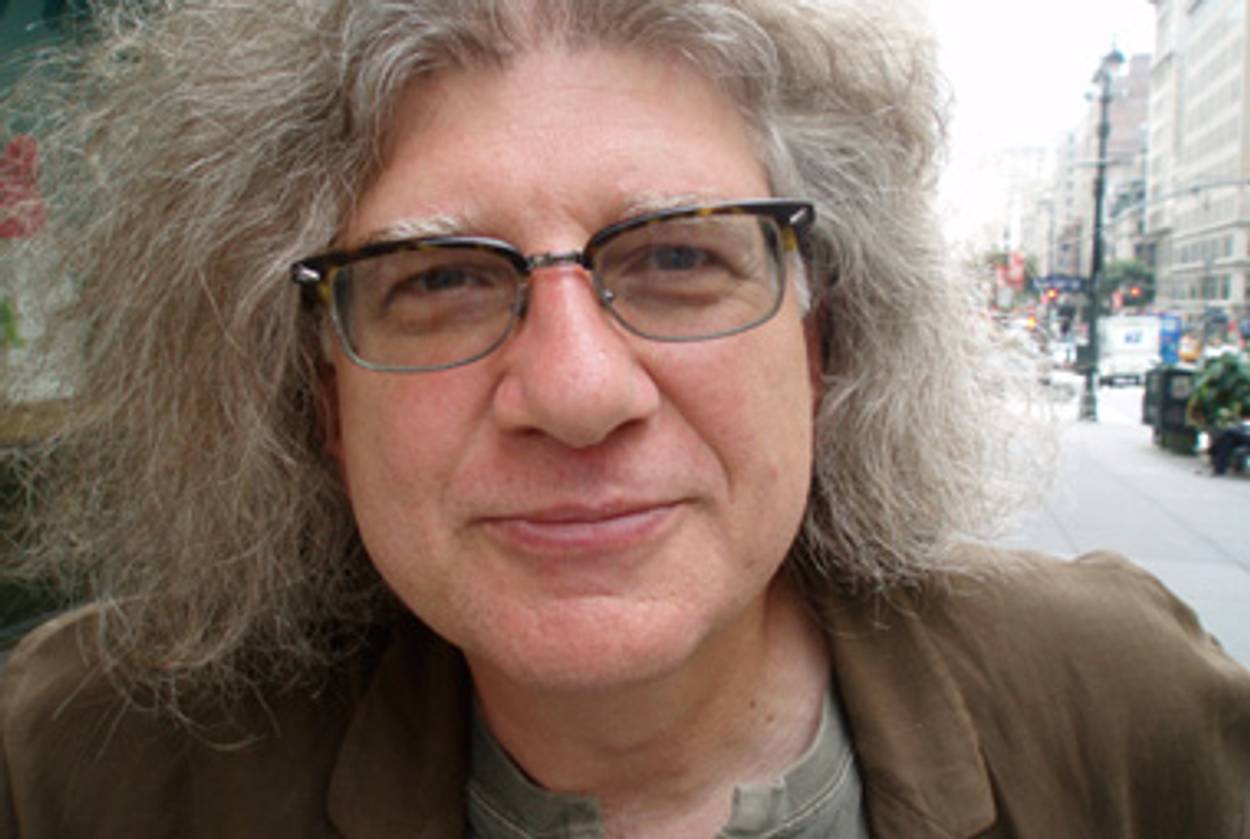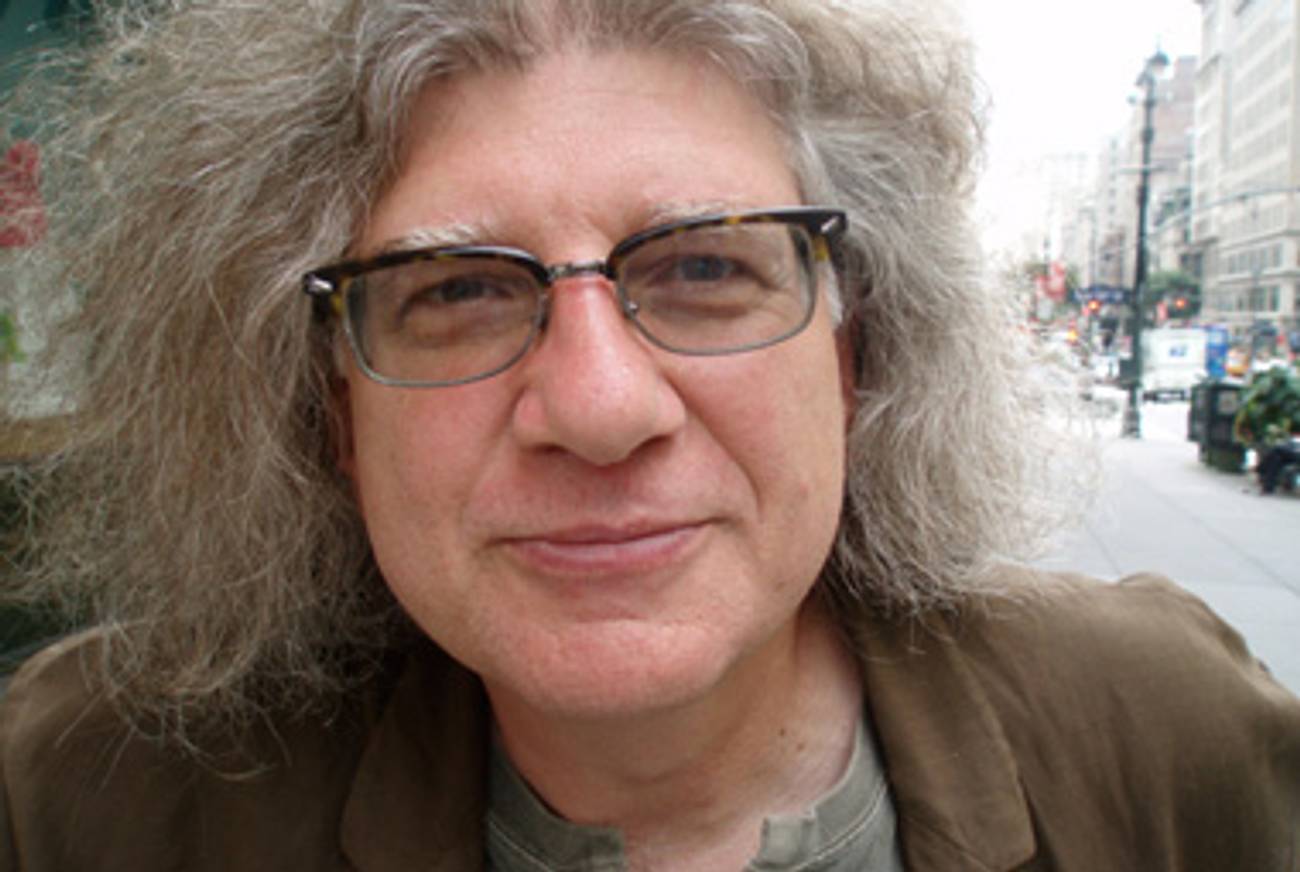Young at Heart
Ammiel Alcalay’s new book—a challenging collection of notes, photographs, and diary entries he wrote in the 1970s—shows the young scholar and experimental poet through the eyes of his older self




It’s hard to describe Ammiel Alcalay without making lists of his attributes. He is an academic, a poet, and a novelist. He is a translator of little-known or much-ignored literature, as well as a journalist, a human rights activist (most significantly on behalf of Bosnians and Palestinians), and a gadfly. He speaks many languages, has many strong commitments, and does a lot of interesting things.
Alcalay’s most recent book, “neither wit nor gold” (from then), reminds us that he started off as and remains very much a poet. To understand what he’s up to, it helps to remember an image from two decades ago, a few lines from his best-known piece of academic writing, the provocative After Jews and Arabs: Remaking Levantine Culture. At the beginning of this passionate defense of “impure,” polyglot culture (his model is pre-expulsion Spain), Alcalay cited Maimonides. Following the Jewish sage’s warning that all light is not the same, Alcalay presented his own historical work as a form of dialectics, a constant shuttling between presumed causes and assumed effects:
Untangling the strands of the past—or submitting to their confusing but exhilarating intricacy—cannot simply be an act of recognition, of fitting events into fixed patterns, of just seeing the light. It must begin, rather, by apprehending the sources of light and the present objects they shade or illuminate, and follow with an active, incessant engagement in the process of naming and renaming, covering and uncovering, consuming and producing new relations, investigating hierarchies of power and effect: distilling light into sun, moon, and fire.
Alcalay doesn’t see the complications of the past as a cause for despair but rather as a source of hope. Through thought old relations become clearer, and new ones become bracingly possible.
Alcalay is therefore something of a utopian—I mean this as a compliment—and as with many utopians it is hard to distinguish his radicalism from his conservatism. This comes through most clearly in his poetics, in the way that he puts his creative works together. On the one hand, his book-length albums of borrowed language and surprising juxtapositions identify him as an “experimental” writer, in the fine tradition of modernist and post-modern literary collagists. (It is a nice but not necessary fact that as a child he played badminton with the monumental avant-garde poet Charles Olson.)
On the other hand, he traces his insistence on quotation back to the medieval Hebrew practice of shibbutz—which, in the words of Hebrew scholar David Yellin, cited by Alcalay in After Jews and Arabs, is “the lighting of a candle from a lamp already lit, or the kindling of flame from a fire already blazing.” In earlier poetry, the original light was Scripture and the first spark was divine. In Alcalay’s work, though, that spark is secular and historical. His poetry aims to retrieve what has been lost to oblivion and, more important, lost to violence. Alcalay’s most impressive poetic work to date, the book-length from the warring factions, is an elliptical meditation on the atrocities committed during the Bosnian civil war of the early 1990s. Alcalay has borrowed most of its language and formulations from documentary sources, and its “I” is very rarely Alcalay himself. And yet this process can yield evocative, haunting results:
do not feel badly because you have lost
sight of this daylight no matter how hard
I try nothing happens today to you alone
those who have reached the place where
death stands waiting have not pointed out
a way to circumvent it I myself grieve when
I look back there into the past it is enough
to make anyone ponder now here at last
we are ready to end this when you start
to leave you must not think back
with regret you always return
garment of brightness
wildnerness
in the midst
of plenty
There are a lot of people here. This scary little passage teems with with I’s and you’s and they’s and we’s. They keep changing places, and the perspective does as well.
That fugal ambition is key to Alcalay’s project. He wants his readers to see from a number of viewpoints and take a number of positions. This necessarily involves seeing himself in the third person, looking at himself from a certain distance. In “neither wit nor gold” (from then), Alcalay has taken various things he wrote during the 1970s—poems, notes, diaries, many reproduced in their original handwriting or font—and made something of a scrapbook from them. He intercuts these rags and patches with photographs of musicians he took during the same period, and he creates a portrait less of himself than of a certain milieu at a certain time.
Beyond the musical references, what gives this book its historical resonance is not so much its details—although they can be telling—as its period style. Alcalay, who is now in his late fifties, comes from New England, and he hung around in Boston, where he seems to have been strongly influenced by the odd mixture of Beat hipness and poetic altitude that marks the work of the underappreciated John Wieners. In a way, the young Alcalay sounds more like a member of a previous generation. He listens to jazz, not rock, to Archie Shepp, not Janis Joplin.
“neither wit nor gold” demands from its reader a good ear for style and a sophisticated ability to jockey between the past and the present. The title poem stands at the book’s threshold, and its archaic diction, a riff on the 17th-century poet Anne Bradstreet’s riff on the Book of Matthew, places you in a historical no-man’s land:
rust and time
nor wit nor
gold abet the
old song’s burden
part prophecy part
longing the hanging
garden a shadowy
dream the world
grows so very old
though once we
too were young
My guess is that Alcalay takes “burden” here in its musical sense, meaning a refrain or a chorus. He therefore seems to be offering a little apology for the writing that follows. But the present from which he tenders this is also old (or old-fashioned), at least as far as its language is concerned. We are the future—longed for, prophesied—that the past dreamed of and wrote poems about. This future though is also time-bound and never as modern as it thinks. Our present is shot through with the traces of those prophecies and dreams, just as our language bears our history within it.
As a chart of his early poetry’s longings, “neither wit nor gold” points forward to Alcalay’s subsequent career—you can hear what his writing wanted to be and what it would become. It also shows precisely when and where it started. That said, the book doesn’t display the politics that subsequently came to distinguish Alcalay’s career. The poems in this book precede the eight years he spent in Israel in the late 1970s and 1980s and therefore come before his involvement with the Israeli Black Panthers and with Palestinian-rights organizations. They precede his celebration of “Levantine” culture. They precede his work in and on Bosnia. They seem to come before Alcalay himself.
And to a certain extent, that is precisely Alcalay’s point. Although the young poet of “neither wit nor gold” can be sentimental, this is not a sentimental book. The older Alcalay does not seem particularly nostalgic for his previous self. Rather, the capacity to see from another’s point of view that informs from the warring factions marks this book as well. In this case, though, Alcalay is not involved in direct address to a “you,” nor is he trying to imagine another person’s experience. He approaches his experience as if it were somebody else’s. He takes his own poetry, his own notebooks, and his own diaries as documentary evidence of another person’s life and therefore presents them as the index of a different, never-quite-forgotten world.
It is as hard to describe “neither wit nor gold” as it is to describe its author. It is a poetry book that is not exactly a book of poetry. It excerpts very, very badly because every page relies on its context and every poem and fragment, every note and picture, on its neighbors. It depends on its look as much as on its sound. Its title warns us that it lives between negations just as its title’s punctuation tells us that it is made of quotations. But to say that its title tells us all hardly tells the half of it.
David Kaufmann teaches literature at George Mason University.
David Kaufmann teaches literature at George Mason University.